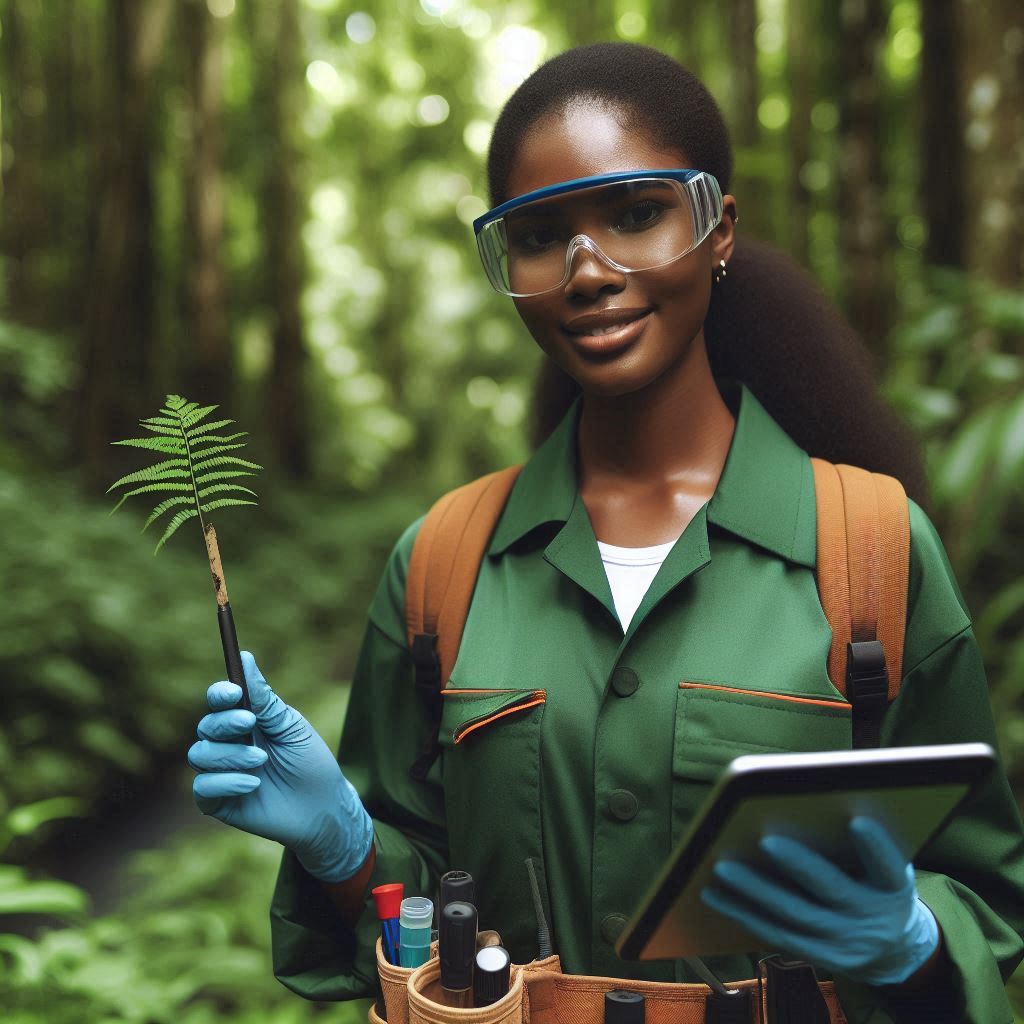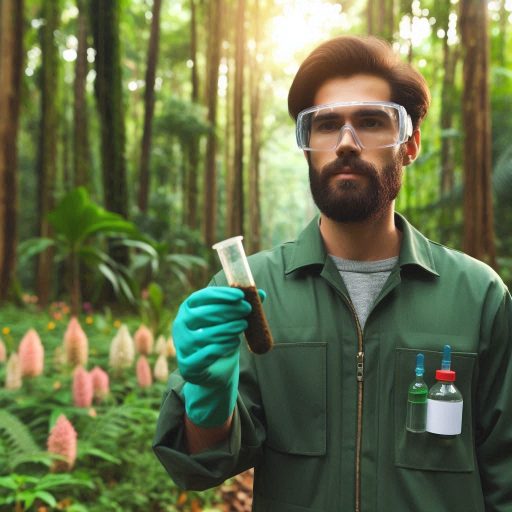Introduction
Environmental technicians play a crucial role in monitoring and managing environmental quality.
They collect samples from air, water, and soil to test for pollutants.
Technicians analyze this data to assess environmental conditions and ensure compliance with regulations.
Their work supports efforts to prevent pollution and promote sustainability.
various industries, environmental technicians are essential.
In manufacturing, they monitor emissions and waste management to minimize environmental impact.
construction, they ensure that projects comply with environmental standards and manage site contamination.
government agencies, they help enforce environmental regulations and conduct environmental impact assessments.
Their expertise also supports environmental consulting firms and research institutions focused on environmental issues.
This blog post will provide an in-depth overview of the environmental technician industry.
First, it will explain the key responsibilities and daily tasks of environmental technicians.
Next, it will explore the importance of their role across different sectors and industries.
The post will highlight how technicians contribute to environmental protection and compliance.
Finally, it will discuss current trends and future prospects in the industry, offering insights into how the role of environmental technicians is evolving.
By understanding these aspects, readers will gain a comprehensive view of the industry and the critical role technicians play in safeguarding our environment.
Responsibilities of an environmental technician
Conducting Environmental Assessments and Collecting Data
Environmental technicians play a crucial role in assessing environmental conditions and collecting data.
They conduct field surveys to gather samples from soil, water, and air.
Accurate data collection is essential for understanding environmental issues and making informed decisions.
Technicians use various tools and equipment to measure pollutants and assess ecological impacts.
Detailed reports based on this data help identify environmental problems and guide remediation efforts.
Proper training and meticulous attention to detail are critical for reliable data collection and assessment.
Effective environmental assessments support informed decision-making and help protect natural resources.
Monitoring Pollution Levels and Implementing Mitigation Strategies
Monitoring pollution levels is a key responsibility for environmental technicians.
They track emissions and pollutant concentrations in air, water, and soil.
Regular monitoring helps detect pollution sources and evaluate their impact.
Technicians also develop and implement mitigation strategies to address pollution issues.
These strategies might include recommending changes in industrial processes or proposing cleanup measures.
By identifying pollution trends, technicians help prevent environmental damage and protect public health.
Successful mitigation requires ongoing monitoring and adjustments based on data analysis.
Technicians play a vital role in ensuring effective pollution control and environmental preservation.
Ensuring Compliance with Environmental Regulations and Standards
Ensuring compliance with environmental regulations and standards is a fundamental task for environmental technicians.
They must be familiar with local, state, and federal environmental laws.
Technicians conduct inspections to ensure that practices and facilities meet regulatory requirements.
They also prepare documentation and reports to demonstrate compliance with environmental standards.
Non-compliance can result in legal penalties and environmental harm, making adherence crucial.
Technicians often work with regulatory agencies to address any compliance issues and implement necessary corrections.
Maintaining up-to-date knowledge of regulations helps ensure ongoing compliance and environmental protection.
Collaborating with Engineers and Scientists on Environmental Projects
Collaboration with engineers and scientists is integral to environmental technician roles.
Technicians often work as part of multidisciplinary teams on various environmental projects.
Engineers may design systems for pollution control, while scientists analyze environmental data and trends.
Technicians provide essential field data and practical insights that support these efforts.
Effective communication and teamwork are vital for successful project outcomes.
Technicians contribute valuable hands-on expertise, helping to implement and test environmental solutions.
By working closely with other professionals, technicians help develop and execute comprehensive environmental strategies.
Read: Recent Trends in Surveying and Mapping Technologies
Educational requirements and skills needed
Environmental technicians need a mix of formal education and practical skills to excel in their roles.
Typically, an associate’s degree in environmental science, environmental technology, or a related field is required.
Some positions might necessitate a bachelor‘s degree for more advanced roles or specialized areas.
Courses in chemistry, biology, and environmental science provide foundational knowledge crucial for the job.
In addition to formal education, technicians should develop key skills to succeed.
Analytical skills are essential for interpreting data from environmental tests and assessments.
Technicians must be detail-oriented to accurately collect and analyze samples, ensuring precise results.
Essential Degrees for Environmental Technicians
A degree in environmental science, biology, or a related field is crucial for aspiring environmental technicians.
This educational background provides a strong foundation in ecological principles and environmental systems.
It equips you with the knowledge needed to understand complex environmental issues and contribute effectively to solutions.
Institutions offering specialized programs ensure you gain relevant expertise and technical skills.
Analytical and Problem-Solving Skills
Strong analytical and problem-solving skills are essential for environmental technicians.
You will often analyze environmental data, interpret findings, and identify trends.
These skills help you to diagnose issues and develop effective solutions.
Mastering analytical techniques and problem-solving strategies is vital for assessing environmental impacts and improving practices.
Continuous practice and application of these skills will enhance your ability to address complex environmental challenges.
Knowledge of Environmental Laws and Regulations
Understanding environmental laws and regulations is a critical aspect of the role.
Environmental technicians must be familiar with local, national, and international regulations.
This knowledge ensures compliance and helps avoid legal issues.
Regulations govern aspects such as waste management, pollution control, and resource conservation.
Staying updated on changes in legislation is important for maintaining regulatory compliance and promoting sustainable practices.
Excellent Communication and Teamwork Skills
Effective communication and teamwork are vital for success in this field.
Environmental technicians often work in teams, collaborating with engineers, scientists, and regulatory agencies.
Clear communication ensures that project goals and findings are understood by all stakeholders.
Additionally, teamwork fosters a cooperative environment, leading to more effective problem-solving and project execution.
Developing strong interpersonal skills enhances your ability to work efficiently with diverse teams and manage complex projects.
Combining Skills for Success
To succeed as an environmental technician, you must integrate these skills and knowledge areas effectively.
A relevant degree provides the academic foundation, while analytical skills enable you to interpret data and solve problems.
Knowledge of laws ensures compliance and effective environmental management, while communication and teamwork skills enhance collaborative efforts and project success.
A degree in environmental science or a related field is essential for becoming an environmental technician.
Strong analytical and problem-solving skills, combined with knowledge of environmental regulations, are crucial for effective performance.
Excellent communication and teamwork skills further contribute to your success in the industry.
Balancing these competencies will prepare you for a successful career in environmental technology.
Read: Safety Tips for Field Surveying Technicians
Job Opportunities in the Environmental Technician Industry
Employment Opportunities in Environmental Fields
Environmental technicians have diverse employment opportunities in various sectors.
They work in environmental consulting firms, government agencies, and research organizations.
Consulting firms offer roles in assessing environmental impacts, compliance, and remediation projects.
Government agencies provide positions related to regulatory enforcement, environmental monitoring, and policy development.
Research organizations focus on data collection, analysis, and developing new environmental technologies.
Each sector provides unique opportunities for career growth and professional development.
Specialization Opportunities
Specializing in specific environmental areas can enhance career prospects and job satisfaction.
Air quality specialists monitor and analyze pollutants to ensure compliance with regulations.
They work on projects that aim to improve air quality and public health.
Water conservation experts focus on managing and protecting water resources.
They develop strategies to reduce waste and optimize water usage.
Waste management professionals handle the disposal, recycling, and treatment of waste materials.
Specializing in these areas allows technicians to become experts and address critical environmental issues effectively.
Growth in Demand for Environmental Technicians
The demand for environmental technicians is growing due to an increased focus on sustainability and conservation.
As environmental regulations become stricter, more technicians are needed to ensure compliance and implement solutions.
Companies and governments are investing in sustainability practices to reduce their environmental impact.
This investment drives demand for skilled professionals who can manage and mitigate environmental risks.
Public awareness of environmental issues also contributes to the growing need for technicians.
More organizations seek to address climate change, pollution, and resource depletion, creating additional job opportunities.
Impact of Sustainability Trends
Sustainability trends influence the job market for environmental technicians.
Companies are adopting green technologies and practices to meet sustainability goals.
This shift requires technicians to adapt and apply new methods and solutions.
Innovations in renewable energy, waste reduction, and conservation practices create new roles and responsibilities.
Environmental technicians play a key role in implementing and managing these initiatives.
They help organizations achieve their environmental objectives and enhance their overall sustainability performance.
Career Advancement and Training
Career advancement opportunities are available for environmental technicians who seek to specialize or move into leadership roles.
Gaining additional certifications or advanced degrees can enhance career prospects.
Training in new technologies and methods keeps technicians competitive and relevant.
Networking with industry professionals and participating in relevant conferences can also open doors for advancement.
Staying updated on industry trends and best practices is essential for long-term career growth.
Read: Top Surveying and Mapping Technician Employers

Salary and career advancement prospects
Median salary for environmental technicians
The median salary for environmental technicians reflects the value and demand for their expertise.
As of recent data, environmental technicians earn a competitive median salary.
This amount can vary based on factors like location, experience, and specific industry sectors.
For instance, technicians working in major cities or high-demand areas often earn more.
Salaries typically range based on the technician’s level of experience and specialization.
Entry-level positions may start at a lower rate, while those with several years of experience or specialized skills can earn significantly more.
Additionally, technicians in industries like environmental consulting or governmental agencies often see higher wages.
Transform Your Career Today
Unlock a personalized career strategy that drives real results. Get tailored advice and a roadmap designed just for you.
Start NowPotential for Advancement
Environmental technicians have a strong potential for career advancement.
With experience and further education, technicians can move into specialized roles such as environmental specialists or project managers.
These advanced roles often come with increased responsibilities and higher salaries.
An environmental specialist typically focuses on specific areas such as pollution control or environmental compliance.
This role requires in-depth knowledge and expertise in particular environmental issues.
Project managers oversee larger projects, coordinating teams and managing budgets.
Both positions offer significant career growth opportunities.
Advancement usually involves gaining additional skills and knowledge.
Technicians seeking these roles should aim for further training or education.
Advanced certifications or degrees can enhance qualifications and open doors to higher-level positions.
Continuing Education and Certification Options
Continuing education is crucial for career growth in the environmental technician field.
Technicians can pursue various certification programs to stay updated with industry standards.
Certifications such as the Certified Environmental Professional (CEP) or Certified Environmental Technician (CET) can boost career prospects.
Many educational institutions offer specialized courses or degrees related to environmental science and technology.
Enrolling in these programs can provide a deeper understanding of complex environmental issues.
Such qualifications are often required for advanced roles and can lead to promotions.
Additionally, staying current with industry trends and technologies through workshops and seminars is beneficial.
Many professional organizations provide resources and training for ongoing professional development.
Engaging in these opportunities helps technicians remain competitive and informed.
Environmental technicians enjoy a solid median salary with significant potential for career advancement.
Progressing to roles like environmental specialist or project manager is achievable with experience and additional qualifications.
Continuing education and certification are essential for growth and staying relevant in this evolving field.
By investing in their professional development, technicians can enhance their career opportunities and long-term success.
Read: Impact of Drones on Surveying and Mapping
Gain More Insights: Day in the Life of a Materials Engineer
Challenges and opportunities in the environmental technician industry
Addressing Emerging Environmental Issues
Environmental technicians play a crucial role in tackling emerging issues like climate change and pollution.
Climate change impacts ecosystems, weather patterns, and human health.
Technicians must monitor greenhouse gas emissions and implement mitigation strategies.
Pollution, including air, water, and soil contaminants, poses significant risks to the environment.
Technicians are responsible for detecting and managing pollutants, ensuring compliance with regulations.
To address these challenges, technicians use advanced tools and methods for environmental analysis.
They analyze data to understand the extent of environmental damage and identify sources of pollution.
Implementing effective remediation strategies helps in mitigating environmental impacts.
Technicians also collaborate with policymakers to develop and enforce environmental regulations aimed at reducing pollution and combating climate change.
Opportunities for Innovation and Technology Advancement
Innovation and technology play a pivotal role in advancing environmental monitoring.
New technologies enhance the accuracy and efficiency of environmental data collection.
Remote sensing, drones, and satellite imaging provide comprehensive environmental monitoring capabilities.
These tools help in assessing large areas and detecting environmental changes that might be missed by traditional methods.
Advancements in sensor technology enable real-time monitoring of environmental conditions.
This allows for quicker responses to pollution events and better management of natural resources.
Data analytics and machine learning offer powerful tools for predicting environmental trends and assessing risks.
Embracing these technological innovations can significantly improve environmental protection efforts.
Furthermore, technology facilitates the development of sustainable solutions.
Renewable energy technologies, such as solar and wind power, help reduce reliance on fossil fuels.
Innovations in waste management, like recycling and waste-to-energy systems, contribute to reducing environmental impact.
Environmental technicians must stay informed about these technological advancements to leverage them in their work.
Importance of Staying Updated on Industry Trends
Staying updated on industry trends and best practices is essential for environmental technicians.
The field of environmental science is dynamic, with frequent updates in regulations and technological advancements.
Regularly reviewing industry publications and attending conferences can keep you informed about the latest developments.
Networking with peers and participating in professional organizations also helps in staying current.
These interactions provide insights into new trends, challenges, and solutions in the environmental sector.
Continuous education and training are crucial for maintaining expertise and adapting to new technologies and practices.
By staying updated, technicians can enhance their skills and apply the latest methods to their work.
This not only improves their effectiveness but also contributes to the overall progress in environmental protection.
Embracing new trends and practices ensures that technicians remain relevant and effective in addressing emerging environmental issues.
Addressing climate change and pollution requires proactive efforts from environmental technicians.
Embracing technological advancements and staying updated on industry trends are crucial for effective environmental monitoring and management.
By leveraging innovation and continuously improving their skills, technicians can significantly impact environmental protection and sustainability.
Uncover the Details: Becoming a Telecommunications Technician: A Step-by-Step Guide
Discover More: Engineering Technician: Specializations and Career Paths
Importance of Networking
Joining Professional Organizations
Joining professional organizations, like the National Environmental Health Association (NEHA), offers significant benefits for environmental technicians.
Membership in such organizations provides access to valuable resources and industry updates.
NEHA, for example, offers certifications, training, and networking opportunities that can enhance your career prospects.
Being part of these organizations keeps you informed about regulatory changes, best practices, and technological advancements.
They often provide members with exclusive access to industry publications, research reports, and professional development tools.
Engaging with these resources can help you stay ahead in your field.
Additionally, professional organizations offer platforms for connecting with peers and industry leaders.
Attending Conferences and Workshops
Attending conferences and workshops is crucial for staying current on industry developments.
These events gather experts, innovators, and peers in one place, offering a wealth of knowledge.
Conferences often feature keynote speakers, panel discussions, and breakout sessions on the latest trends and technologies.
Workshops provide hands-on experience and practical skills that are directly applicable to your job.
They often cover new methods, tools, and regulations that can impact your work.
By attending these events, you gain insights that help you adapt to evolving industry standards.
Moreover, conferences and workshops offer opportunities to engage in discussions and ask questions about emerging issues.
Building Relationships with Industry Professionals
Building relationships with industry professionals is essential for career advancement.
Networking with peers and leaders can provide mentorship, career advice, and job leads.
Establishing connections through professional organizations and industry events fosters a supportive network.
Attend networking sessions, social events, and informal gatherings to build and strengthen relationships.
Follow up with new contacts after events to maintain the connection.
Share your expertise and offer assistance to others, as reciprocal support often leads to valuable career opportunities.
Engage actively on professional social media platforms like LinkedIn.
Regularly update your profile and participate in discussions relevant to your field.
These interactions can help you stay visible and connected with industry trends and opportunities.
Practical Steps for Effective Networking
To maximize your networking efforts, develop a clear plan for engaging with industry professionals.
Set goals for the types of connections you want to make and the events you plan to attend.
Prepare a brief introduction and be ready to discuss your interests and expertise.
Be proactive in reaching out to new contacts and expressing genuine interest in their work.
Offer to share knowledge, collaborate on projects, or provide support in areas where you have expertise.
Building meaningful relationships requires ongoing effort and engagement.
Joining professional organizations, attending industry events, and building relationships with peers are key strategies for advancing your career as an environmental technician.
These actions will keep you informed, enhance your skills, and open doors to new opportunities.
Conclusion
This blog post has explored the dynamic field of environmental technology.
We highlighted the importance of environmental technicians in safeguarding our environment.
Technicians play a crucial role in monitoring, analyzing, and managing environmental systems.
Their work ensures compliance with regulations and helps address environmental challenges.
We discussed the diverse career opportunities available in this industry.
From fieldwork to data management and regulatory compliance, environmental technicians are in demand across various sectors.
The profession offers a rewarding path with significant impact on environmental protection and sustainability.
Consider pursuing a career in environmental technology if you are passionate about the environment.
This field provides numerous opportunities for growth and development.
Technicians contribute to meaningful work that directly benefits ecosystems and communities.
For further exploration, seek out resources that provide insights into career opportunities.
Professional organizations such as the National Association of Environmental Management (NAEM) offer valuable information and networking opportunities.
Websites like the Environmental Protection Agency (EPA) and job boards specializing in environmental careers can help you find relevant job listings and industry news.
[E-Books for Sale]
The Big Book of 500 High-Paying Jobs in America: Unlock Your Earning Potential
$19.99 • 500 High-Paying Jobs • 330 pages
Explore 500 high-paying jobs in America and learn how to boost your career, earn more, and achieve success!
See All 500 High-Paying Jobs of this E-Book
1001 Professions Without a Degree: High-Paying American Jobs You Can Start Now
$19.99 • 1001 Professions Without a Degree • 174 pages
Discover 1001 high-paying jobs without a degree! Unlock career tips, skills, and success strategies for just $19.99!




